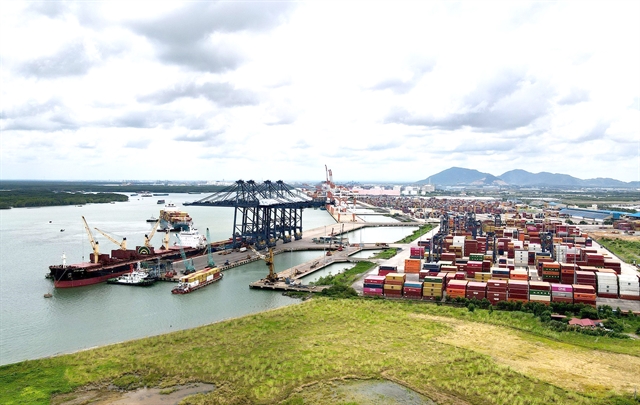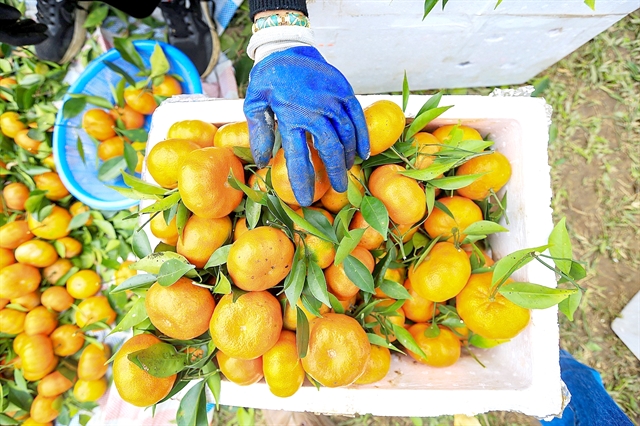Together with UKVFTA, UK accession to CPTPP to leverage bilateral trade
The UK and Việt Nam already have a separate free trade agreement – the UKVFTA – in place but CPTPP will add benefits to bilateral trade and investment.
 |
|
A view of Gemalink International Port in Bà Rịa - Vũng Tàu with containers lined for exports. With the UKVFTA and CPTPP, the bilateral trade and investment exchanges between Việt Nam and the UK are believed to grow rapidly in the coming time. — VNA/VNS Photo |
HÀ NỘI — Together with the UK – Việt Nam Free Trade Agreement (UKVFTA), the accession of the UK to the Comprehensive and Progressive Trans-Pacific Partnership (CPTPP) is expected to leverage bilateral trade and investment cooperation to new heights.
“With the UKVFTA and CPTPP, the bilateral trade and investment exchanges between Việt Nam and the UK are believed to grow rapidly in the coming time,” Tạ Hoàng Linh, Director of the European – American Markets Department under the Ministry of Industry and Trade, said.
The dual impulse from the two agreements will create further opportunities for Vietnamese goods to expand in the UK, which has an annual import value of up to £900 billion (US$1.134 trillion) and the UK goods and services in Việt Nam as well as promoting investment flows.
According to David Johnstone, Head of Policy and Engagement, FTA Utilisation under the UK’s Department for Business and Trade, the CPTPP will add benefits to bilateral trade and investment.
Since leaving the EU, the UK has negotiated a range of new FTAs with other partner countries such as Việt Nam, Japan, Australia and New Zealand.
For CPTPP, the UK applied in February 2021 and officially signed the agreement in July 2023, in New Zealand.
CPTPP is a deep FTA between 12 economically diverse countries which covers over 500 million people and has a combined GDP of £12 trillion or 12 per cent of the global GDP or 14 per cent of the global GDP if the UK is included.
“CPTPP is not only just the largest trade block but also a modern and high-quality agreement with provisions on data and services which are the most modern of any agreement in global trade,” he said.
While the UK signed the CPTPP, this hasn’t yet come into force in the UK.
David expected the CPTPP will become operational in the second half of 2024 when Việt Nam and the UK can start to benefit from some provisions.
He pointed out that in some areas, the CPTPP provides more favourable tariffs than under the UKVFTA.
Under the CPTPP, over 99 per cent of current UK goods exports to CPTPP members will be eligible for zero tariffs, he said, adding that access to the same tariff preferences that Việt Nam grants to CPTPP members will benefit beyond the existing UKFTA.
For example, tariffs will be eliminated sooner on some UK exports of chocolate, pork, poultry as well as some medicinal products and engines. In addition, the agreement allows more flexibility on supply chains and for cumulation.
It will also boost services cooperation and encourage investment between the UK and Việt Nam.
“Việt Nam also benefit from UK joining CPTPP,” he said.
For trade in goods, Việt Nam is expected to gain some further market access on some agricultural products such as rice and seafood.
For example, Việt Nam will have permanent access to a separate duty-free tariff rate quota for long grain milled rice and this quota will increase incrementally over the next eight years. On seafood, tariffs will also be eliminated for all Việt Nam’s exports of seafoods which include tuna, to the UK.
““The high standards and removal of barriers can help support our mutual economic security by deepening participation in each other’s supply chains,” he said.
On investment, the UK’s membership to CPTPP will deepen investment commitment and boost Việt Nam as a destination for UK investors, he said, adding that new provisions in CPTPP will provide more certainty to UK investors in Việt Nam and make it easier for Việt Nam to seek further investors from the UK.
There are also shared benefits of CPTPP, including integration of supply chains through increasing the attractiveness of Việt Nam and the UK for sourcing inputs from each other to qualify for preferential tariffs to other CPTPP countries and ease of doing business with more security for investors, he pointed out.
Strength from resonance
“CPTPP is just one part of the strong trading relationship between Việt Nam and the UK,” David said.
“The trade between the two countries expanded significantly, by 6 per cent last year, which demonstrates a considerable trade partnership already which we hope will continue long into the future.
“The UKVFTA has created a really strong foundations for our shared trading relationship and CPTPP will strengthen that even further and help accelerate the integration of the two economies.
“What’s exciting about the two agreements is we have a very high foundation already with the UKVFTA and businesses on both sides are using that, but CPTPP adds some additional benefits such as giving investors the confidence that they can take investment decisions in Việt Nam.”
As the two agreements will continue to exist in parallel, it is very important for businesses to understand the details of each of these agreements because there are a lot of differences. Businesses need to understand which agreement is more beneficial for specific products to opt for which one to trade under, he said.
He urged businesses on both sides to engage with the agreements, adding: “Understand the additional benefits. Go through some of the details of what that means in practice. There is the opportunity there. The road is built. It’s the point of how to drive on the road.”
It is necessary to help business understand that there are support frameworks in place through FTAs, and long-term plans like JETP that are taken together to increase the attractiveness of Việt Nam to UK companies and also give Vietnamese companies the confidence to trade more with the UK since Brexit, he said.
 |
|
A Cao Phong orange garden in Hoà Bình Province. Switching to green production is a must or Vietnamese enterprises to gain competitive advantage for exporting to the UK. — VNA/VNS Photo |
Nguyễn Cảnh Cường, former Trade Counsellor at the Vietnamese Embassy to the UK, said Vietnamese firms must carefully study the consumption trends in the UK to promote exports to this market.
The UK is a pioneering country in the global trend of environmentally friendly production and consumption, emissions reduction, and climate change adaptation, he said.
The UK Government is aiming to address carbon leakage risk to support decarbonisation through a range of proposed policy measures including a carbon border adjustment mechanism (CBAM) which is similar to the EU.
Cường said enterprises must study CBAM, take steps to renovate production technology and promote green production and energy transition if they don’t want to lose the competitive advantages while exporting to the UK.
He urged Vietnamese exporters to pay attention to labelling, certificate of origin to be able to take advantage from the trade deals to expand exports to the UK.
Cường also pointed out potential industries include eco-farm, energy efficiency, electric vehicle, and smart production.
According to Anh Dao Carrick, director of Carrick Properties Investment Ltd., Vietnamese enterprises attach special importance to product quality, consistency of quality, ESG practicing, sustainable value chain to export to the UK.








